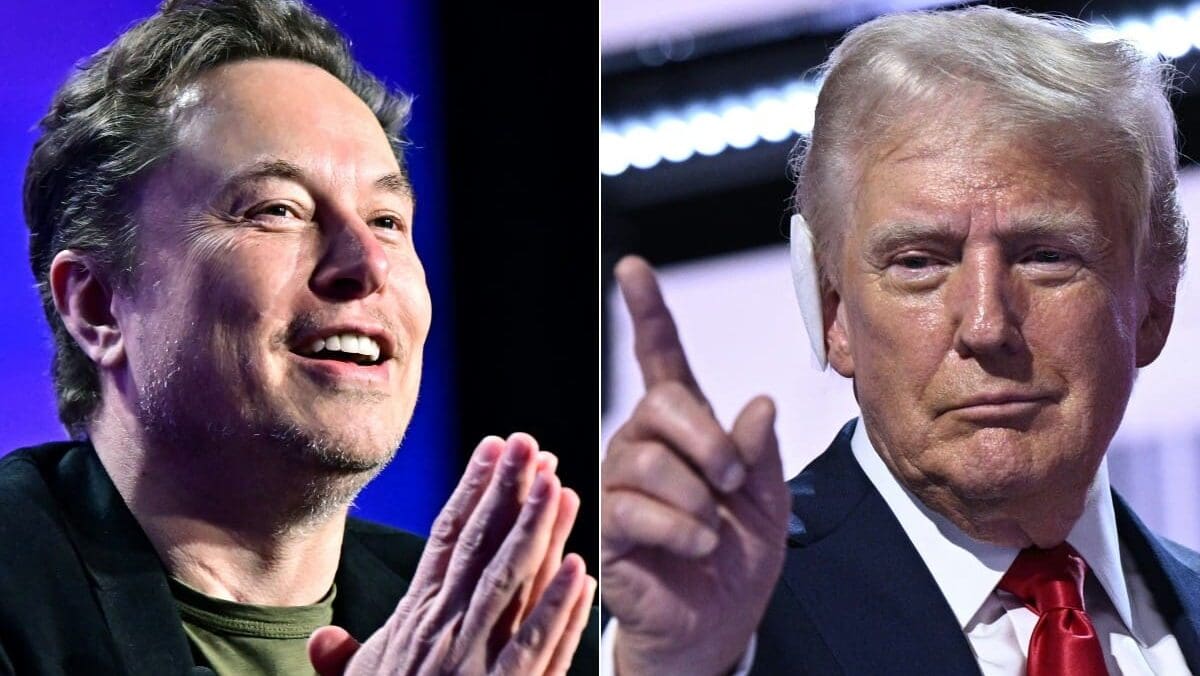
X Owner Elon Musk and President Donald Trump.
Photo: Frederic J. BROWN and Brendan SMIALOWSKI / AFP
After being suspended for years for his alleged role in the January 6th riots in Washington DC back in 2021, Donald Trump returned to X with a two-hour live podcast interview co-hosted by platform owner Elon Musk on Monday, August 12th. The interview peaked at over one million active listeners at one point, and has since been viewed 100 million times with the discussion around it generating one billion impressions on the platform.
This kind of massive public outreach for a right-wing politician, even for a U.S. presidential candidate, obviously does not sit right with Brussels, judging by how the EU Commission tried to limit Trump’s exposure to European audiences beforehand by threatening Musk with legal ramifications if he allows the former president or any X user to promote content that’s deemed “illegal” in the EU.
Internal Market Commissioner Thierry Breton—the EU’s self-styled “digital enforcer” responsible for creating the bloc’s infamous social media censorship tool, the Digital Services Act (DSA)—sent a letter reminding X of its obligations as a ‘very large online platform’ (VLOP) under EU law. According to Breton, X must actively prevent the dissemination of content that “may incite violence, hate, and racism in conjunction with major political—or societal—events around the world, including debates and interviews in the context of elections.”
As a subtle threat, Breton “reminded” Musk that there is already an open non-compliance case against X for the alleged violations of DSA rules, including the lack of moderation of content promoting “hate and racism” in the context of the recent wave of protests in the UK. Brussels “will be extremely vigilant to any evidence that points to breaches of the DSA and will not hesitate to make full use of our toolbox … to protect EU citizens from serious harm,” Breton warned.
With great audience comes greater responsibility #DSA
— Thierry Breton (@ThierryBreton) August 12, 2024
As there is a risk of amplification of potentially harmful content in 🇪🇺 in connection with events with major audience around the world, I sent this letter to @elonmusk
📧⤵️ pic.twitter.com/P1IgxdPLzn
Naturally, the self-proclaimed “free speech absolutist” Musk could not be threatened so easily. The billionaire found a creative way to hit back at the Commission by posting an iconic line from the movie Tropic Thunder—“Take a big step back and literally f**k your own face!”—saying that he wanted to reply with that but he’d never be “so rude and irresponsible.”
Later, during the interview, Musk brought up Breton’s letter indirectly when discussing freedom of speech with President Trump. “There’s a lot of attempts to do censorship, and to force censorship even on Americans from other countries,” he told Trump, pointing out that while in office, the former president would never do anything similar despite the constant and relentless attacks on him by mainstream media that often involved fake news and false accusations.
Elon Musk Calls Out European Commissioner for Trying to Censor His Conversation With Trump
— The Vigilant Fox 🦊 (@VigilantFox) August 13, 2024
Thierry Breton threatened Musk with a letter, saying, “With great audience comes greater responsibility.”
Musk replied to his threat with a brutal meme that read, "Take a big step back… pic.twitter.com/RYoPjaFRVx
Breton’s letter was met with much criticism on this side of the Atlantic as well, with conservative lawmakers calling out the EU Commission’s apparent double standards when it comes to the freedom of speech and right-wing politics.
Rob Roos, a former Dutch MEP who until recently served as the Vice Chair of the European Conservative and Reformist (ECR) group in Brussels, has called the DSA “Orwellian,” and pointed out that no EU regulation can be placed above universal human rights set in stone by the treaties of the United Nations and the European Court of Human Rights (ECHR).
“Everyone has the right to freedom of opinion and expression; this right includes freedom to hold opinions without interference and to seek, receive and impart information and ideas through any media and regardless of frontiers.” Roos quoted Article 19 of the UN’s Universal Declaration of Human Rights (1948).
As for the European Convention of Human Rights (1950), the text offers even more concrete wisdom to this particular case given that there are only a few months left until the U.S. elections, by calling freedom of expression “crucial for democratic processes … [and] a cornerstone of a democratic society.”
Freedom of speech is not just a right – it is a necessity for a healthy democracy.
— Rob Roos 🇳🇱 (@Rob_Roos) February 9, 2024
The European Commission wants to kill @elonmusk's platform X with the Orwellian #DSA.
I call this censorship.
If they succeed, our democracy will be the biggest victim: pic.twitter.com/WRV7MYMJy4
